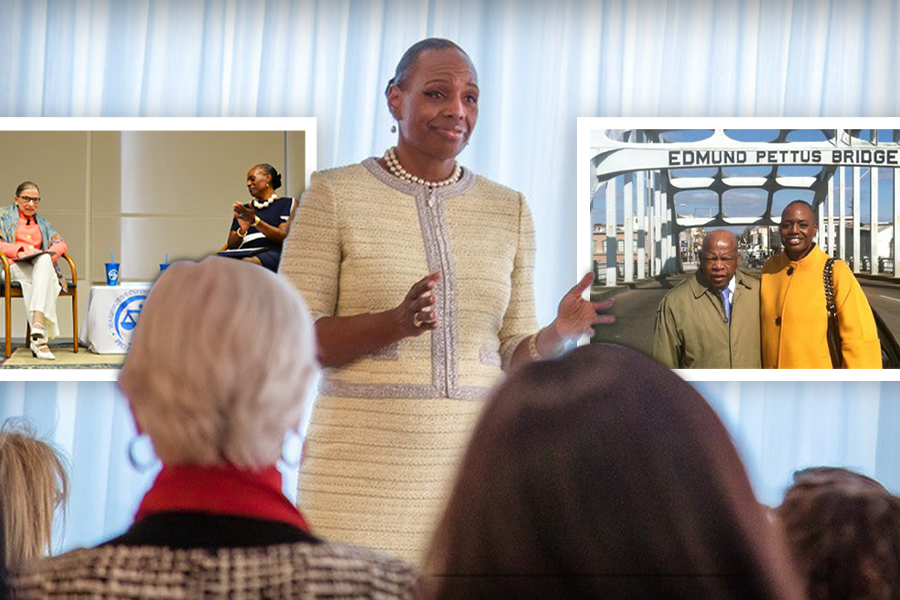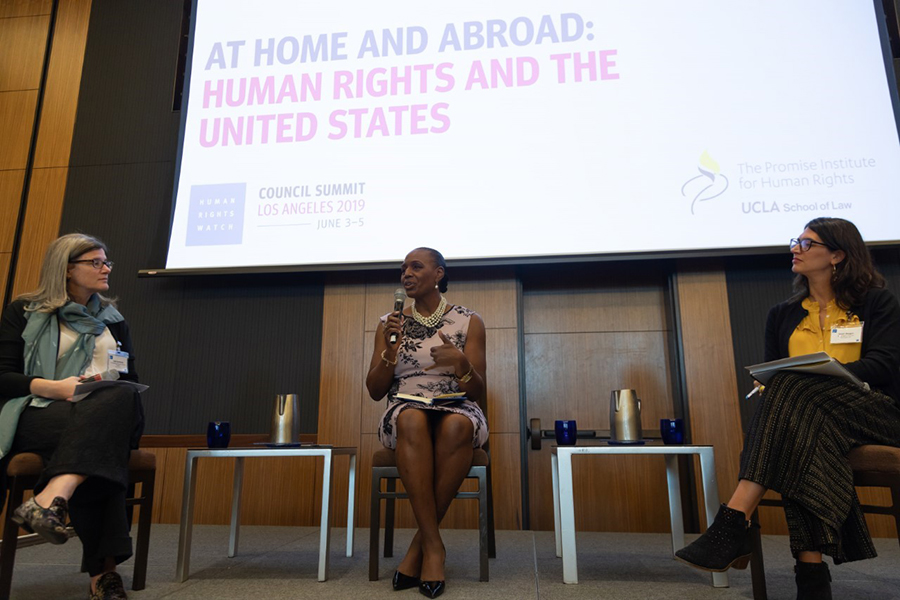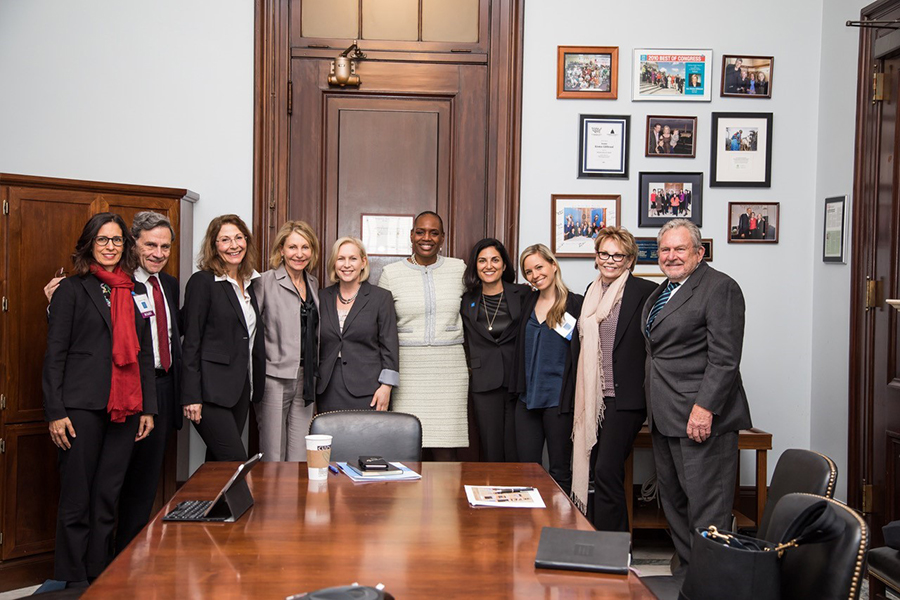
Liberty and Justice for All
Nicole Austin-Hillery encourages others to share their voices and embrace opportunities to make a difference at home and around the world
By Amanda S.F. Hartle
Nicole Austin-Hillery was barely a teenager when she discovered her calling during an eighth-grade English class.
As part of the course’s speech and debate unit, each student chose their own topics. Nicole’s selections always dealt with economic justice, racial injustice and defending those who could not speak for themselves. Her teacher noticed and named Nicole “Most Likely to Succeed in a Field Involving Public Speaking.”
“It was through those conversations and that period of learning when I was 13 that I realized the best way for me to utilize my skills and passion was to become a civil and human rights lawyer,” says Nicole, a Dietrich College of Social Sciences and Humanities alumna who holds an undergraduate degree in history.
Decades later, as the U.S. program executive director for Human Rights Watch since 2018, she has expanded her drive for change to the global stage as part of an organization that, in addition to tackling the U.S. domestic agenda, addresses the world’s biggest crises such as Syria’s civil war, the Rohingya genocide, refugees in Europe and South Sudan’s conflict, among others.
“Human rights and civil rights are inextricably linked. In the United States, the human rights movement grew out of the civil rights movement, so they are partners,” Nicole says. “There is no light between the two. You cannot do work on immigration, water rights, women's rights and LGBTQ rights without understanding that those are human rights issues.”
The Community That Made Her
Nicole grew up in Harrisburg, Pennsylvania, as part of “an extremely supportive community” on a cul de sac in a two-story townhouse located in a public housing complex.
“My community was no different than any other. We kept our doors and windows open and all the neighbors knew each other. We had flower-planting days, and all the kids played with each other,” Nicole says. “It was just a community of people who, because of economic circumstances, qualified for public housing. It was upon learning that people looked at us differently because we were kids who lived in public housing that I developed an understanding of what disparities were.”
 She never let others’ perceived notions slow her upward trajectory as she split her high school days between an arts magnet school and an academic-focused high school — a combo that would lead her to Carnegie Mellon University where she initially planned to pursue a drama degree.
She never let others’ perceived notions slow her upward trajectory as she split her high school days between an arts magnet school and an academic-focused high school — a combo that would lead her to Carnegie Mellon University where she initially planned to pursue a drama degree.
“I wanted the best of both of those worlds but in an environment that felt like a real college experience. CMU gave me all of that: high-class academics, a top-notch drama program and a sense of community and belonging.”
Once she arrived on campus, she embraced another love — advocacy.
While serving as president of SPIRIT in her junior and senior years, Nicole advocated for expanding Hunt Library’s limited selection of books about African American history, protested at The Fence to urge the university to recognize Martin Luther King, Jr. Day before it was a federal holiday and fought against a fraternity’s buggy that showcased Confederate symbolism.
“Carnegie Mellon made me the leader that I am today. It gave me the space and the opportunity to learn what it meant to identify issues, work in coalition, speak up and speak out,” she says. “At Carnegie Mellon, I felt like I could take on and do anything. I was fearless, my colleagues were fearless, and Carnegie Mellon nurtured that in us.”
Knowing that she wanted to be a lawyer, while an undergraduate in the School of Drama, Nicole asked for special permission to overload her schedule to combine College of Fine Arts courses with classes at the Dietrich College.
“I know that experience in the theater and studying acting helped me to develop a way to relate to people and understand different situations and scenarios. It was an amazing foundation for the work I have gone on to do,” Nicole says.
Focused, Steadfast and Stalwart
After graduating from CMU and spending several years working in advocacy and policy with the Pennsylvania Legislature and with the NAACP Legal Defense and Educational Fund, Inc., Nicole earned her JD at Howard University. She started her legal career as a George N. Lindsay Civil Rights Law Fellow at the national office of the Lawyers’ Committee for Civil Rights Under Law where she focused on housing discrimination issues and went on to a civil rights law firm where she represented women and people of color who faced workplace discrimination.
From there, she became the founding director and counsel for the Brennan Center for Justice’s Washington, D.C. office. As the organization’s chief representative before Congress and the Executive Branch, she worked alongside civil rights heroes like the late U.S. Congressman John Lewis, one of Nicole’s personal heroes, on issues like criminal justice, racial justice, voting rights and good government — “all the issues that make sure that America remains true to its original promises and values,” Nicole says.
 At Human Rights Watch, Nicole and her team focus on addressing and combating systemic racism, improving the U.S. immigration system, tackling problems within the criminal justice system and advocating for policies to address poverty and inequality informed by international human rights standards.
At Human Rights Watch, Nicole and her team focus on addressing and combating systemic racism, improving the U.S. immigration system, tackling problems within the criminal justice system and advocating for policies to address poverty and inequality informed by international human rights standards.
“I work to help elevate issues for communities and people who have often historically been discarded, disfranchised and set aside. I am able to help them tell their stories and to position them to give voice to their experiences,” she explains. “That is what I enjoy the most, and that is why I do this work.”
She also strives to change the way that Americans think about issues like housing, education, policing, access to water and equality and understand the nexus between the values and rights cherished by Americans and trans-global human rights concerns.
She admits that the arc of history moves slowly, and says she stays optimistic by looking to the past and at those around her for inspiration.
“Relying on the history of African Americans reminds me that there is nothing we cannot get through or overcome,” Nicole says. “I know there will always be warriors who never give up, who remain focused, steadfast and stalwart in finding and seeking justice.”
And right now, is the perfect time for all of us to embrace our inner strengths, she says.
“We all can be what I like to call “citizen warriors.” We have an opportunity to use the space where we sit to create change,” Nicole says. “Everyone is part of a community — a church community, an academic community, a work community, a neighborhood community, so share your voice to have conversations and identify places where within your own community you can have an impact.”
“We all have a role to play and that means no matter what your station in life is, no matter where you live, no matter where you've come from, everyone has the opportunity to make a difference.”